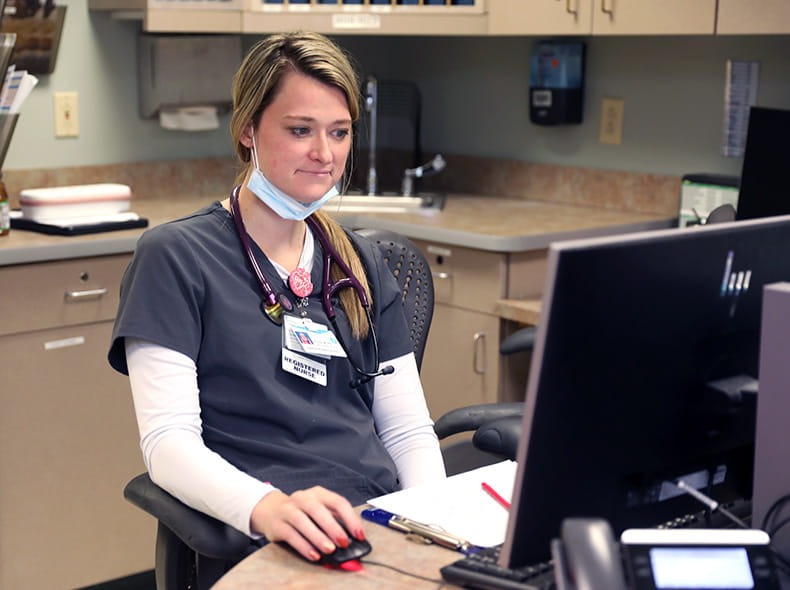
Enhancing nursing education
The Clinical Faculty and Preceptor Academy is now open.
Clinical Faculty and Preceptor Academy
Welcome to the Nursing Clinical Faculty and Preceptor Academy (CFPA)! This academy is dedicated to our nursing colleagues who are graciously willing to take the next step in educating our next generation of nurses. The CFPA is designed to guide experienced nurses along the pathway of novice to expert educators within the clinical setting. Here, you’ll find a specially designed educational program, tools and resources to help you grow and find success.
We hope you’ll find the CFPA boosts your confidence and provides what you need to become the best clinical faculty or preceptor you can be. Thank you for taking the next step to enriching your career and so many students’ careers going forward. And thank you for choosing us to be part of your journey!
Rebecca Stoudt, DNP, PhD, CRNA
Associate Dean of Nursing Student Education
Geisinger College of Health Sciences

About the academy
The Clinical Faculty and Preceptor Academy (CFPA) includes an online program designed to prepare practicing nurses for the role of a preceptor or clinical faculty instructor for undergraduate nursing students. Through completion of the initial CFPA learning program, learners will gain a wealth of knowledge related to best practices in clinical preparation and education. Learning opportunities will be added to the academy over the next several years and will be available for alumni to enhance their clinical teaching expertise.
In partnership with PA Action Coalition, Geisinger is enhancing nursing education to address nursing faculty and instructor shortages with the development of the CFPA.
This collaboration allows for academy development with funds awarded by the U.S Health Resources and Services Administration (HRSA), CDFA#93.359. The CFPA will help us recruit and retain experienced nurses to train the nurses of tomorrow.
Addressing the nursing faculty gap
The CFPA is taking steps to fill the faculty gap in schools of nursing and increase nursing workforce retention by leveraging staff nurses to participate as skilled preceptors and clinical instructors.
Nurses do not often get proper education or training on how to teach undergraduate nursing students. Feeling unprepared or unqualified to educate nursing students can lead to burnout, resulting in valuable experienced nurses leaving the academic arena.
The CFPA will help fill the nursing education gap by creating a comprehensive, self-guided program that trains staff nurses to be skilled preceptors and clinical faculty.
This program, to be piloted at Geisinger, will:
- Enhance nursing education
- Encourage frontline staff to assume clinical teaching roles
- Grow the nursing workforce by increasing students’ access to clinical rotations
- Enhance inpatient nurse retention with professional development opportunities
CEU credits and financial incentives
Nurses who enroll in and complete the CFPA modules — online and at their own pace — will be awarded a certificate of completion and can receive continuing education units (CEUs) that can be used to fulfill educational requirements for re-licensure and/or nursing certifications.
In addition to the CEUs, Geisinger nurses who participate in the CFPA may be eligible for a financial incentive based on level of participation while precepting undergraduate nursing students. Clinical faculty who instruct a cohort or multiple cohorts of undergraduate nursing students may also be eligible for a financial incentive. Further details regarding the financial incentive program will be posted before financial incentives become available on Oct. 9, 2023.
The creation of the CFPA, in collaboration with PA Action Coalition and an advisory board of thought leaders from higher education and healthcare organizations, will allow us to develop, standardize and distribute this online pedagogy to higher education and healthcare organizations across HRSA Region 3 (Pennsylvania, Maryland, Delaware, Virginia, West Virginia and Washington, D.C.).
Program partners
The CFPA is made possible with help from our program partners. Learn more about their missions and how to contact them.
The Pennsylvania Action Coalition (PA-AC) is a program of the National Nurse-Led Care Consortium, a subsidiary of Public Health Management Corporation. The PA-AC was established in 2011 to promote a healthy Pennsylvania through improvements in the quality, accessibility and safety of nursing.
As part of the national Campaign for Action, established by the Robert Wood Johnson Foundation, AARP and the AARP Foundation, the PA-AC works to implement the recommendations of the 2010 Institute of Medicine (now National Academy of Medicine) Future of Nursing: Leading Change, Advancing Health and The Future of Nursing 2020-2030: Charting a Path to Achieve Health Equity report. The PA-AC fosters cross-sector collaborations to build a culture of health through nursing leadership. Its partners include leaders from healthcare institutions, academia, foundations and nursing organizations including specialty and minority nursing organizations.
The PA-AC serves as a strong partner of Geisinger with expertise in building strategic partnerships, professional workforce development and implementing communications campaigns. The PA-AC leveraged their network to build the membership of the CFPA Advisory Board. Through Geisinger’s partnership with the PA-AC, the CFPA Advisory Board will disseminate the CFPA curriculum, using established relationships to regional nursing programs and healthcare organizations across Delaware, Maryland, Pennsylvania, Virginia, West Virginia and Washington, D.C. They will also bring the grants’ financial incentive funding to medical institutions allowing for increased usage of the program in HHS Region 3 during the grant period.
Learn more about the PA-AC.
The National Nurse-Led Care Consortium (NNCC), a subsidiary of Public Health Management Corporation, is a 501(c)(3) nonprofit member-supported organization working to strengthen community health through quality, compassionate and collaborative nurse-led care. The organization’s mission is to advance nurse-led healthcare through policy, consultation and programs to reduce health disparities and meet people’s primary care and wellness needs.
To get in touch with our program partners, reach out to the following contacts:
Jennifer Gimbel, MBAPennsylvania Action Coalition Director
jhorn@phmc.org
Thea Phim, MPA
Public Health Project Manager
tphim@phmc.org
Jilian Bohn, MPH
Public Health Project Coordinator
jbohn@phmc.org
Health Resources and Services Administration (HRSA)
HRSA is the primary federal agency for improving access to healthcare services. Its grants provide financial support to healthcare providers and facilities. The administration’s mission is to improve health outcomes and to achieve health equity through access to quality services, a skilled workforce and innovative high-value programs.
HRSA recognized the need for education and development of nurses to become clinical faculty and preceptors to assist in the progressive nursing shortage that continues to worsen. Ten grants of up to $4 million, over four years, were awarded for the development of a Clinical Faculty and Preceptor Academy.
Funding for this program:
Geisinger was one of 10 grant recipients across all 10 HRSA regions within the United States. As part of the grant, Geisinger received funding to pilot a financial motivational component to determine if it would produce an increase in the number of clinical faculty and/or preceptors. The HRSA grant period runs from Sept. 30, 2022, through Sept. 29, 2026.
Learn more about Geisinger
This project is supported by the Health Resources and Services Administration (HRSA) of the U.S. Department of Health and Human Services (HHS) as part of an award totaling $4 million with no percentage financed with non-governmental sources. The contents are those of the author(s) and do not necessarily represent the official views of, nor an endorsement, by HRSA, HHS or the U.S. Government.

